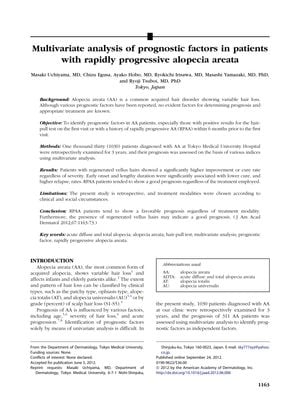Multivariate Analysis of Prognostic Factors in Patients With Rapidly Progressive Alopecia Areata
September 2012
in “
Journal of The American Academy of Dermatology
”

TLDR Patients with rapidly progressive alopecia areata often have a better outlook and shorter disease duration, with regrown fine hairs and no past alopecia being positive signs.
The study conducted at Tokyo Medical University Hospital involved 1,030 patients with alopecia areata (AA), including 199 with rapidly progressive alopecia areata (RPAA). It found that RPAA patients generally had a favorable prognosis and a shorter disease duration compared to non-RPAA patients. The presence of regenerated vellus hairs was a positive prognostic factor for both RPAA and severe AA, indicating a higher likelihood of improvement or cure. Early onset and longer disease duration were linked to lower cure rates and higher relapse rates in all AA patients. A previous history of AA was associated with a higher risk of relapse in RPAA patients. Treatment modality did not significantly affect prognosis. The study concluded that regenerated vellus hairs and the absence of a previous history of AA are good prognostic indicators for RPAA, although the study's retrospective nature and non-randomized treatments were limitations.










